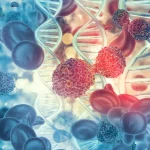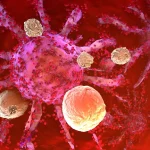Reproduction and Fertility
In general
In general, chemotherapy disrupts the reproductive functions of both men and women.
Women may experience irregularity, even an interruption in the menstrual cycle, or the occurrence of hot flashes, especially as they approach menopause. However, it is still possible to get pregnant. It is therefore strongly recommended to use contraception. Chemotherapy can have a harmful effect on fetal development.
Women of childbearing age should talk with a member of the medical team about the best choice of contraception during treatment, family planning, future projects and their family. In most cases, once chemotherapy is completed, the menstrual cycle will resume as before, and a normal pregnancy may be considered, depending on the doctor’s advice.
In men, there may be a decrease in sperm count and lessened sperm viability. This decrease in fertility in no way hinders erection and sexual activity. Some chemotherapy treatments can permanently impair fertility.
Hence, chemotherapy can affect fertility in women and men, but it does not compromise the ability to have sex. On the other hand, it is possible that anxiety about the illness, fatigue and a diminished sense of well-being can temporarily result in lower sexual desire.































